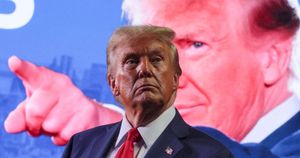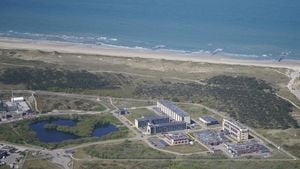European Union's new top diplomat is preparing for what some are dubbing one of the toughest jobs around. Kaja Kallas, Estonia's former Prime Minister, is stepping up to lead EU foreign policy at a time when the geopolitical climate is nothing short of turbulent. Following her nomination, Kallas underscored her firm commitment to supporting Ukraine against Russia, highlighting the necessity for the bloc to stand united amid growing global tensions.
Kallas made her case during her confirmation hearing before EU lawmakers, where she expressed unyielding support for Ukraine: "Backing Ukraine as long as it takes" became her rallying cry. She faces significant challenges, particularly with the anticipation of Donald Trump’s potential return to the presidency, which could complicate American support for Ukraine. Kallas indicated her plans to engage with Trump's team to leverage bipartisan support for Ukrainian aid, saying, "The EU and the United States are stronger and safer when we work together."
Addressing the broader geopolitical challenges the EU faces, Kallas pointed out the intersection of stability and security. She stated plainly, "The situation on the battlefield is difficult. And that's why we must keep working every day. Today, tomorrow and for as long as it takes and with as much military, financial and humanitarian help as needed." This commitment is particularly relevant as Europe braces for the coming months, feeling pressures from both Russia and its own political divisions.
Kallas articulated the need for Europe to become more self-reliant, emphasizing the importance of developing its own strategic interests, particularly concerning China. During her three-hour hearing, she outlined how China's support for Russia complicates the situation, emphasizing, "Without China’s support, Russia would not be able to continue its war with the same force." She proposed introducing higher costs for China’s involvement, hinting at potential sanctions as options to deter their covert aid to Russia.
While Kallas’s position as the head diplomat is largely viewed as secure, with EU leaders having chosen her for this role back in June, other members of the new European Commission face scrutiny. Lawmakers expressed mixed feelings about Raffaele Fitto, Italy’s nominee, who is closely aligned with the hard-right political sphere; his confirmation seems less certain. Many EU representatives channel their frustrations toward maintaining cohesion among member states, as diverse assertions about governance emerge.
Concerns about the EU's long-term strategy are echoed by several lawmakers wary of Fitto's allowance for political power. Kallas’s own remarks and convictions were regularly tested throughout the parliamentary session, focusing not only on Ukraine but also on her proposed strategies for addressing human rights, the Middle East, and trade relations—particularly with Mercosur, the South American trade bloc. Kallas emphasized the necessity of fostering ties before they are filled by competitors like China, who she warned poses unique threats to the EU's economic interests.
While discussions were heavily centered around Ukraine, Kallas also mentioned the need for EU nations to receive clear guidance on future human rights policies. Notably, she made reference to the Middle East trying to balance the security interests of Israel alongside the existence of Palestine, stating, "The security of Israel has to go together with the existence of Palestine." This attempt to recognize both sides reflects the nuanced, albeit fraught nature of European diplomacy.
With Kallas at the helm, the EU is working to coordinate its stance on significant global issues—a feat complicated by varying member state perspectives. The upcoming months will likely reflect not just Kallas's diplomatic approach but the EU’s ability to navigate the interconnected crises it faces today, particularly as it positions itself between Russian aggression in Ukraine and the balancing act required for engagement with major global players like the United States and China.



